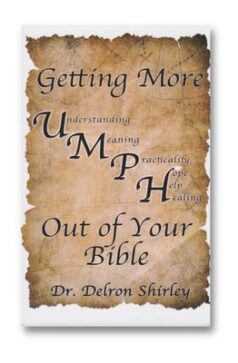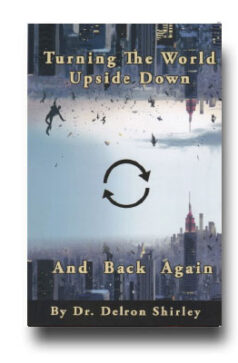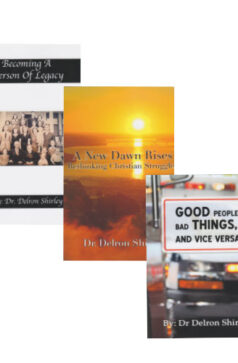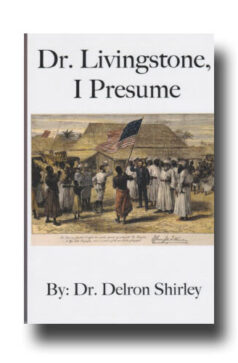One of my friends tells the story of how his father often promised him things and somehow failed to come through, but the most traumatizing event was the day that he sat at home all day waiting for his dad to show up to take him to the circus. When nightfall came, and the father had not shown up, the little boy’s heart was broken – not because of anything he did, but totally because of someone else’s lack of responsibility.
In my trophy shelf sits a fifty-billion-dollar note from the African nation of Zimbabwe – a reminder of the suffering that devastated the country when uncontrolled inflation destroyed their economy. With an inflation rate of thousands of percents, the money and bank accounts of the people became totally worthless. Many of my friends in the country had worked their whole lives to save up a “nest egg” for retirement – only to have what should have been enough to live on for years barely pay for a week’s worth of groceries. These were good, honest Christian people, but they lost everything they had worked their whole lives for because of someone else’s greed and inadequate economic policies.
Certainly we all know praying parents whose hearts are broken by prodigal children who go exactly the opposite way from how they were raised. One couple who are close friends of ours had a beautiful daughter who was a dedicated Christian young lady – even pursuing a Bible college degree – yet she came home one day with the announcement that she was pregnant. The parents loved her and were careful to protect her dignity and respect in spite of her condition. The baby was born, and the grandparents sacrificially covered the cost of a new member in their family. The daughter then turned her back on all that she had once stood for, moved out of the house, and started a career in the legalized recreational marijuana business. The parents’ world essentially “caved in around them” – not from any fault of their own, but totally because of the poor choices of their wayward daughter.
We all know that slavery was abolished more than a century ago, but the fact is that there are actually more slaves in the world today than at the peak of the slave trade that brought thousands of Africans to the Americas. Today we use the term “human trafficking,” but the meaning is the same – someone is forced into a life of servitude and humiliation. I know a couple of those individuals who were snatched away to a less-than-human life of essentially “pack animals” for others. And the most tragic thing about the two individuals that I have in mind as I write is that both were slaves in the homes of their own relatives. It is amazing how parallel their stories are – one, a young boy in Sri Lanka; the other, a young girl in Nigeria; both from poor families that could not support all the children. In both cases, the parents thought that they could give their children a better life if they asked an uncle to adopt just one out of their brood so they would have enough to properly care for the rest. The only thing that they did not know was that in both cases, the uncle saw the new youngster in the home as free help. Cooking, cleaning, laundry, farming, peddling goods on the street corner – there was no end to the demands that the cruel uncles placed upon these tender little children. In return, they got only the scraps that were left after the family had finished their meals, they had no proper bed to sleep in, and they wore only tattered clothes that had been thrown away by their cousins – essentially rags. These innocent children suffered horribly because of no fault of their own; but rather because of the poverty of their natural families and the cruelty and inhumane greed of their heartless uncles.
These are just a few cases out of a litany of stories I could tell that prove just one point – we can’t blame karma when bad things happen to good people. These individuals all suffered tragic lives but did nothing to deserve their plight. It is because life is filled with stories like these – and even more heartbreaking ones – that Hindu philosophers invented the idea of reincarnation, or transmigration of souls. When they couldn’t find a sufficient reason for the suffering that was all too real in the lives of innocent individuals, they simply made up the excuse that their present suffering was the result of some bad things that they had done in previous lives. This life was their second – or possibly, one hundredth or one thousandth – chance to make things right. Of course, such an idea is totally contrary to the Bible, “It is appointed unto men once to die, but after this the judgment.” (Hebrews 9:27) One lifetime and one judgment – not multiple chances – that’s all we are promised. Therefore, we have to decide that when bad things happen to good people who have not done anything to deserve it that it’s best to put the blame where it belongs – on the evil perpetrators. Unfortunately, it seems to be a human tendency to add insult to injury by trying to blame ourselves – just like the Hindus do – even when we have to make up a reason to pin the guilt on ourselves.
My wife does a lot of counseling with women who have been verbally, physically, and sexually abused – including incest cases. And one of the amazing things that she discovers time and time again as she works with these battered women is that they continue to say that they somehow feel that what has happened to them was their fault. Many of them feel that they weren’t pretty enough, that they were too fat, that they weren’t smart enough – and the list goes on and on. We have also seen the same guilt complex manifest itself in children whose parents divorce. In some strange way, the children – totally overlooking the faults of the parents – often adopt the blame and assume that the family could have stayed intact if they had not been part of the equation. Of course, all such thoughts are simply deceptions that eat away at the victims from the inside while the external abuse is working to destroy them from the outside.
Let’s take a look at a biblical example to get a godly perspective on such situations. If Joseph of the Old Testament had any fault that brought on the calamities in his life, it was nothing more than naivety. When he had the dreams that his brothers would bow down before him, he was just too childish in his thinking to realize that – as the policeman warns during an arrest – anything you say can and will be used against you. He could have saved the whole tragic story that determined his entire young adulthood by simply following the simple pattern that Mary in the New Testament did – to keep all the revelations private and ponder them in his heart. (Luke 2:19) Before you jump ahead of me and say that the things that happened in Joseph’s life were all part of a divinely orchestrated plan, allow me to ask one simple question, “Couldn’t God have gotten Joseph into Pharaoh’s court some other way?” I would suggest that the Creator God had many other creative – and less painful – strategies for fulfilling the destiny that He had for this young man to save the world from the ravages of the seven-year famine.
Now, back to the story. Jealousy drove his brothers to plot his death. Greed caused them to alter their course and sell him as a slave. Vanity forced Potiphar’s wife to entrap him when he shunned her advances. Pride – the need to protect his station in life, the desire to preserve his wife’s dignity, and the necessity to look like a hero – dictated that his master throw Joseph into prison without a trial. Selfishness ordained that the butler forget his promise to arrange for his release. Joseph suffered in the pit, in Potiphar’s house, and in the prison because of other people and their self-gratifying schemes; yet, he came through it all with “flying colors.” How? In two different dialogues that he had with his brothers, we see that Joseph had a very powerful internal resource that he was able to draw upon when bad things happened to him. The first conversation was at the point when he revealed his identity to his brothers. Knowing that they would be overwhelmed with the guilt of their despicable deeds, Joseph immediately defused their concerns by saying that in spite of their evil intentions God had used their horrid plot for good. (Genesis 45:4-8) After their father’s death, the brothers felt in jeopardy, fearing that the only reason Joseph had shown them favor was the presence of their father. Again, Joseph repeated his heartfelt conviction – that God was working in his favor, no matter how evil the intentions of others were against him. Furthermore, he purposed to do good to them even though they actually deserved judgment. (Genesis 50:19-21) Centuries later, the Apostle Paul would describe what must have gone on inside of Joseph when he penned the words, “Whatsoever things are true, whatsoever things are honest, whatsoever things are just, whatsoever things are pure, whatsoever things are lovely, whatsoever things are of good report; if there be any virtue, and if there be any praise, think on these things.” (Philippians 4:8)
Joseph made a determinate decision as to what he allowed in his mind. Apparently, his thoughts must have been filtered through the same eight criteria that Paul listed here – conditions that must be met before any thought qualifies to be meditated upon. It was true that his brothers had plotted to kill him and that they had sold him into slavery; however, simply because those were facts was not sufficient reason to make these thoughts eligible to become part of Joseph’s thinking process. He had to find something else factual to focus his attention upon – the fact that God used his being in Egypt as a way to save lives. According to Paul’s formula, once a thought passes the truth filter, it then must be subjected to the filter of justice and the honesty filter. What his brothers did to him was the farthest thing from just or honest; therefore, there was no place in his mind for such thoughts. Instead, Joseph had to find thoughts that qualified – the happy homes throughout Egypt and the surrounding area where there was food for the parents to set before their children every day. Next comes the purity filter, then the filter of loveliness, the good-report filter, the virtue filter, and the praiseworthiness filter. Obviously, the diabolical plot of his brothers couldn’t pass through any of these filters – thus, Joseph had to find something else to occupy his thoughts while he languished in the bondage of Potiphar’s house and in the captivity of the prison. The fact that he prospered in the service of Potiphar and eventually found himself in charge of his master’s affairs to the point that Potiphar didn’t even feel that he needed to keep tabs on the business (Genesis 39:6) testifies to the fact that Joseph did not sit around moping about his terrible plight in life; apparently, he was thinking of noble things that made his life productive and brought profit and prosperity to his master. We also see the same thing in the jail where the warden committed all the internal working in the prison to Joseph and didn’t feel that he need to check behind him (Genesis 39:23) – obviously, not the kind of thing that happens to an inmate who spends his time sitting in his cell consumed with the thoughts of the injustices that have been carried out against him.
Allow me to close this section by making a quick reference back to the innocent victims that I introduced to you in the beginning of this chapter – the boy who missed the circus, the victims of the out-of-control inflation in Zimbabwe, the parents of the prodigal daughter, and the two individuals who grew up in slavery. I just want to comment that they are all living happy, productive lives today because they each one determined to not allow their negative external situations to control their internal lives. Instead, they held firm to hope and faith and always determined to see the hand of God at work in their situations. When bad things happened because of others; there is always the promise that good things can happen because of God!










